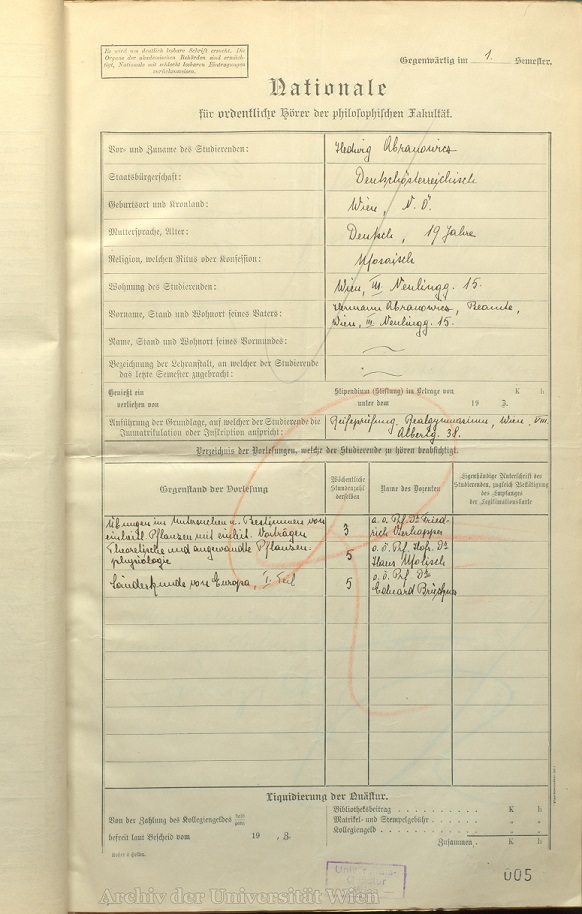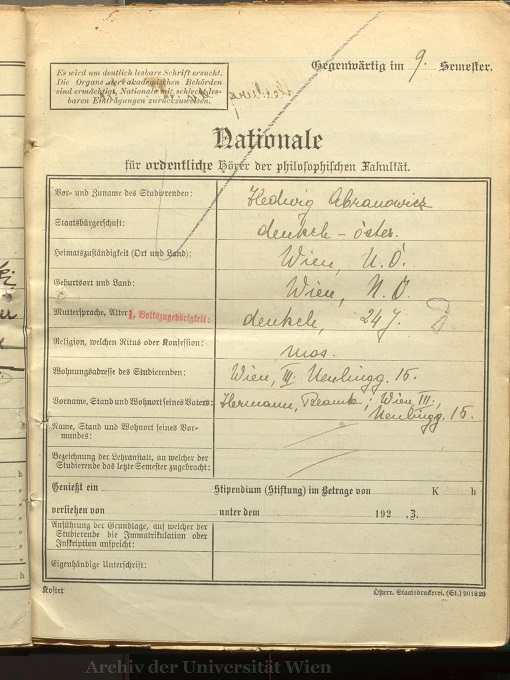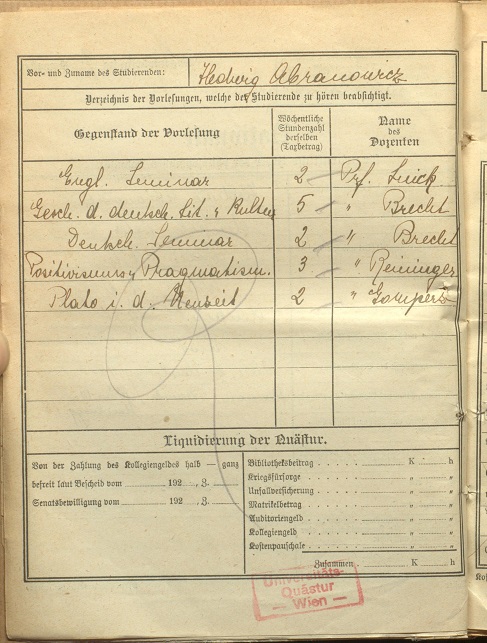| Born: | 03-31-1900 |
| Faculty: | Philosophical School |
| Category: | Deprivation of academic degree |
Hedwig Silvia ABRANOWICZ (married: LEIBETSEDER, later: Vicky ABRAMS), born on March 31st, 1900 in Vienna as the daughter of Hermann Abranowicz (1856-1927) and Marie (Chaje) Abranowicz, née Glanz (1867-1945). In the summer of 1919, she successfully passed the school-leaving examination ("Matura") at the Girls' Realgymnasium in Vienna's 8th district, Albertgasse 38, and subsequently began to study English and German at the University of Vienna from the fall term of 1919/20 onwards, and on July 22nd, 1925, she obtained the degree of "Dr. phil." in German language and literature Studies from the Philosophical School of the University of Vienna (dissertation: "John Drinkwaters biografisch-historische Dramen", advisors: Prof. Luick and Prof. Brecht).
On October 26th, 1938, she was deprived of her academic degree for so-called political reasons.
After her doctorate she had moved to the German Reich, to Berlin, where she worked as a journalist and 1927-1933 as a publishing editor of the magazine Das Magazin. On April 7th, 1930, she married Walter Franz Leibetseder (1901-1983), a Viennese ladies' tailor who had attended the Marxist Workers' School in Berlin in 1925 and worked in a Berlin fur tailor shop from 1928/29. He was politically active in the Social Democratic Party of Germany (SPD) even after it was banned by the Nazis in 1933. He was arrested in 1936 and sentenced to two years in prison.
She herself was politically active from 1930/31 in the socialist resistance group around Walter Loewenheim, which recruited new members underground from 1933 under the name "Neu Beginnen." In the spring of 1936, Hedwig Leibetseder was arrested for her resistance activities and attempted to evade interrogation under torture by attempting suicide by jumping from the 4th floor. However, she survived without serious permanent damage.
On January 9th, 1937, Hedwig Leibetseder was sentenced by the Kammeramtsgericht Berlin (Berlin Court of Appeals) to 2 years and 3 months in prison for "highly treasonable undertakings" and deprived of her civil rights for a period of three years. She served most of her sentence in the women's prison in Jauer.
On September 24th, 1938, the General Prosecutor at the Berlin Court of Appeals informed the Rector of the University of Vienna of her conviction, deprivation of her civil rights, and that she had been imprisoned as of July 26th, 1938, and subsequently transferred to the Lichtenburg concentration camp for women. Thereupon, without further proceedings, on October 26th, 1938, the deprivation of the doctoral degree was noted in the doctoral transcript and an official note was created on the question of the loss of the doctoral degree due to conviction for crimes under old Reich German criminal law:
"If a loss of civil rights, no matter how long, is pronounced in the criminal judgment, one loses the doctoral degree analogously to § 26 StG. The Reich German courts are obligated to notify of every criminal case of an academic the university at which the person concerned has obtained the doctoral degree."
On November 22th, 1938, the Rector's Office of the University of Vienna had the Lichtenburg concentration camp management question Hedwig Leibetseder about the whereabouts of her doctoral diploma, whereupon the concentration camp management reported back on December 7th, 1938: "Protective prisoner Leibetseder" could not remember whether it was with her husband in Berlin or her mother in Vienna. On December 30, 1938, the Rectorate then requested the police in Vienna's 3rd district, Neulinggasse 13/12 "to make inquiries in the apartment of Mrs. Maria Abranowitz as to the whereabouts of the daughter's doctoral diploma [...] and any copies that might be available, [...] the doctoral diploma was to be secured for the prevention of misuse and sent to her". On January 22nd, 1939, the police informed the rectorate that the diploma could not be found and that the mother stated that her daughter had sent it, along with other personal documents, to England before her arrest two years earlier, where she had applied for a teaching position at the time.
After intervention of her sister and after divorce from her husband (judgment of the Berlin Regional Court of April 1st, 1939 - her husband was interned in the Buchenwald concentration camp at that time), she was released to Vienna on March 13th, 1939.
She had to flee Vienna because she was persecuted not only for political reasons, but also for racial reasons as a Jew. She was able to emigrate to England in time, where she lived with her mother at the time of the census in September 1939 with her sister Stella Margit Hrubesch, née Abranowvicz (1904-1993) in Essex in Southend-on-Sea, who had already emigrated to England in 1934.
Her sister Rosalie Cyprienne Ehrlich, née Abranowicz (1896-1985) was able to emigrate to the USA with her family. She had been an employee of the Health Insurance Fund for Trade, Industry and Public Service, but had been dismissed at the beginning of February 1939. She was married to Dr. Otto Ehrlich (1892-1979), and they lived in Vienna's 3rd district, Hegergasse 8, where her husband ran an office for advertising matters.
Hedwig Leibetseder's husband Walter had returned to Vienna in April 1938 after his release from prison in Berlin, where he worked in his father's business. However, he was arrested again at the outbreak of war in 1939 and deported to the Buchenwald concentration camp. After he was released from there in 1940, he built up a small resistance group in Vienna that carried out sabotage. After 1945, he became involved in the newly founded SPÖ and became a member of the Viennese parliament from 1945 to 1958 and a member of the municipal council and district party chairman of the SPÖ Neubau 1945-1947 and 1949-1956.
After the end of National Socialism, Hedwig Leibetseder contacted the University of Vienna from England in 1947 to ask how she could regain her doctorate. Since her divorced husband was a municipal councillor at the time, the request was quickly dealt with. In an official note, the University of Vienna recorded what she had to do to regain her revoked doctorate:
"The registration, irrespective of the fact that it could be cancelled at any time at the request of Mrs. Leibetseder, was in any case unlawful," since Austria was a sovereign state when the verdict was pronounced (09.01.1937) and "according to § 36,1.3 foreign verdicts were in no case to be executed." The entry was made after the Anschluss (26.10.1938) but in the Transition Act, GBlf.Ld.Ö Nr. 262/38 [Announcement of the Reich Governor in Austria, whereby general provisions for the application of criminal provisions of the German Reich in the Land of Austria of 08.07.1938] "it was expressly decreed that provisions according to which loss of civil rights is to be recognized, or can be recognized, are not to be applied in the Land of Austria until further notice."
It was therefore possible for the Academic Senate to reverse the annotation of the deprivation of the doctoral degree in accordance with § 26 StG in a simple manner by means of an annulment resolution.
Thus, 9 years after the revocation and after the end of National Socialism, the doctoral degree was again granted to her on July 2nd, 1947, or the revocation was declared 'null and void from the beginning'.
She never returned to Austria, changed her name to Vicky Abrams in 1949 and lived at 40 Primerose Garden, London NW3 in England.
Dr. Vicky Abrams, née Hedwig Silvia Abranowicz, divorced Leibetseder, died on November 7th, 1989 in London/England.
Lit: Archives of the University of Vienna/enrollemnt forms ("Nationale") PHIL 1919-1925, final examination files and registry ("Rigorosenakt & -protokoll") PHIL 7070, graduation registry ("Promotionsprotokoll") PHIL 1922-1931 No. 758, Rectorate GZ 1299 ex 1937/38; DÖW 6813; The Vienna Holocaust Library/Vicky Abrams personal papers 1031; POSCH 2009, 385; wikipedia; www.DasRoteWien.at; Official Gazette of the City of Vienna November 12th, 1949, 3; kind remarks of Oskar Zürnsack, Vienna 06/2023.
Herbert Posch


